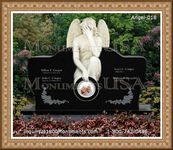|
What To Expect When Writing A Headstone Epitaph
Setting up funeral arrangements is a job that entails a long list of details. These are usually left to a responsible member of the deceased's family or various tasks may be assigned to several individuals for less stress on one mourner. A key part of this duty is composing an epitaph worthy of the person it will represent.
This is a brief statement or phrase, sometimes a poem or prose, that is inscribed on an individual's headstone or commemorative plaque. It says something about the person it represents. There are several different forms this tribute can take, mostly dependent on the deceased's personality, life choices and who is writing it.
Practically every commemorative plaque or stone will bear information identifying the person. In the very least, this includes their name and typically a date for their birth and their death. While some opt to leave it at that, others choose to also add something extra like a sentiment, statement or further details about their life.
Traditionally, these inscriptions are short, touching sentiments stating what the individual meant to those who loved them or wishing them a peaceful rest. Sometimes they attest to what a loving spouse, parent, child or sibling they were, or mention their time in military service. Another popular choice is to use their favorite religious scripture.
A growing number of people are making the choice to write their own goodbyes. By doing so they are able to express themselves more accurately and use a bit of creativity if desired. People with an elevated sense of humor find this to be the perfect opportunity to leave people smiling one last time.
Others may take this opportunity to provide a last bit of sage advice to all who visit their stone. This may be a suggestion to live life fully or any other lesson they might have learned while alive. There are no real rules when it comes to what one can have inscribed on their grave marker.
|
|



























